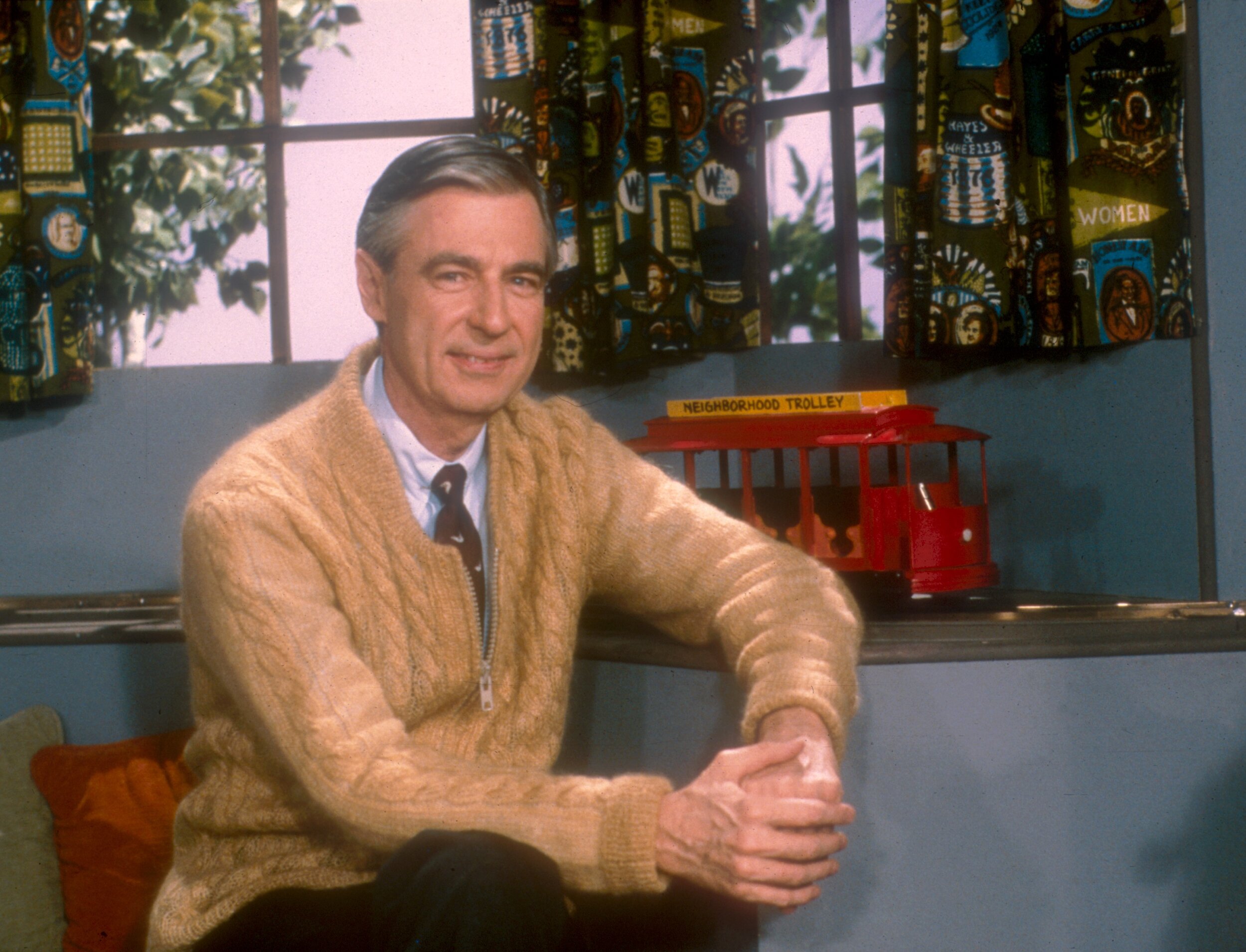Fred Rogers wanted a neighbor “just like you,” but we should all want a lifestyle just like his. Rogers led a vibrant, healthy life, starring on Mr. Rogers’ Neighborhood until age 72. His secret? He didn’t smoke or drink, but other aspects of his life, such as his legendary kindness—Rogers personally responded to every letter he received—also contributed to his stout health. With the new Tom Hanks film A Beautiful Day in the Neighborhood debuting on November 22, here are five ways to live a healthy Mr. Rogers lifestyle:
Photo Credit: The Fred Rogers Company
1. Become a vegetarian. Mr. Roger stopped eating meat in the 1970s: “I don’t want to eat anything that has a mother,” he frequently said. Rogers embraced vegetarianism for religious reasons—as a Presbyterian minister, he believed in the nonviolent treatment of animals—and it kept him slim: The six-foot-tall Rogers maintained a weight of about 143 pounds and weighed himself daily. Medical research supports the upsides of a no-meat diet. Dieters who embraced vegetarianism lost weight more effectively than those on traditional low-calorie diets and also reduced their muscle fat, a study in the Journal of the American College of Nutrition found. Additional research has shown that vegetarianism can cut obesity risks and death rates, prevent heart disease, and lower blood pressure.
2. Embrace kindness (you’ll have more sex). Okay, no one wants to think about Mr. Rogers’ sex life, but kindness can add heat to the bedroom: Generous, altruistic people have more sex than their less-kind counterparts, a study in the British Journal of Psychology found. Kindness is the number one quality that men and women seek in a mate, a September 2019 study showed, which may explain why Rogers’ marriage to wife Joanne lasted over 50 years. Generosity is also a mood booster: The reward areas of the brain are more active when we’re kind, and generous people are happier than those who act out of self-interest, according to a University of Zurich study. Kindness might even improve your social skills: Performing good deeds can help socially anxious people to relax, Canadian researchers found.
3. Hit the pool. Mr. Rogers regularly swam laps, which not only kept him fit and trim, but probably contributed to his persistently positive mood. Exercise can help fight depression in older adults, a McMaster University study found, and it can also boost happiness. One study found that even a single exercise session can positively affect your brain and mood. Swimming offers a variety of benefits, from improving sleep and managing stress to lowering blood pressure. Mr. Rogers also said that his swimming routine kept him disciplined. “A long time ago, many years ago, I promised myself that I would try to swim a certain length of time each day,” he said in an episode where he took viewers to his pool. “I swim back-and-forth about 25 times. That’s a long, long swim.”
4. Play with puppets. Playing isn’t just for kids. Creativity and fun can be mood boosters, and Mr. Rogers embraced both. He was a writer and musician who wrote the melodies and lyrics for over 200 songs, including all of the tunes for Mr. Rogers’ Neighborhood. And c’mon—he spent years talking with a trolley. How fun is that? “Play is the gateway to vitality,” according to the National Institute for Play (yes, there is such a thing). “The prevalence of depression, stress-related diseases, interpersonal violence, the addictions, and other health and well-being problems can be linked, like a deficiency disease, to the prolonged deprivation of play.” Embracing play can be as simple as walking your dog, playing a game, or playing with your kids.
5. Seek spirituality. Mr. Rogers was an ordained Presbyterian minister, and prayer was part of his daily routine. Spirituality can have health benefits—particularly mental health benefits—regardless of religion, a study by researchers at the University of Missouri-Columbia found. “Spiritual beliefs may be a coping device to help individuals deal emotionally with stress,” said co-author Dan Cohen, who noted that spirituality helped patients recover from a variety of conditions. Mr. Rogers died from stomach cancer in 2003, but his faith may have helped him cope. In a video message he recorded shortly before his death, Rogers spoke calmly and compassionately to his now-adult viewers. “I know how tough it is some days to look with hope and confidence on the months and years ahead,” he said. “But I would like to tell you what I often told you when you were much younger. I like you just the way you are.”
Ken Budd is the author of The Voluntourist and the host of 650,000 Hours. Sign up here for the monthly 650,000 Hours newsletter!

